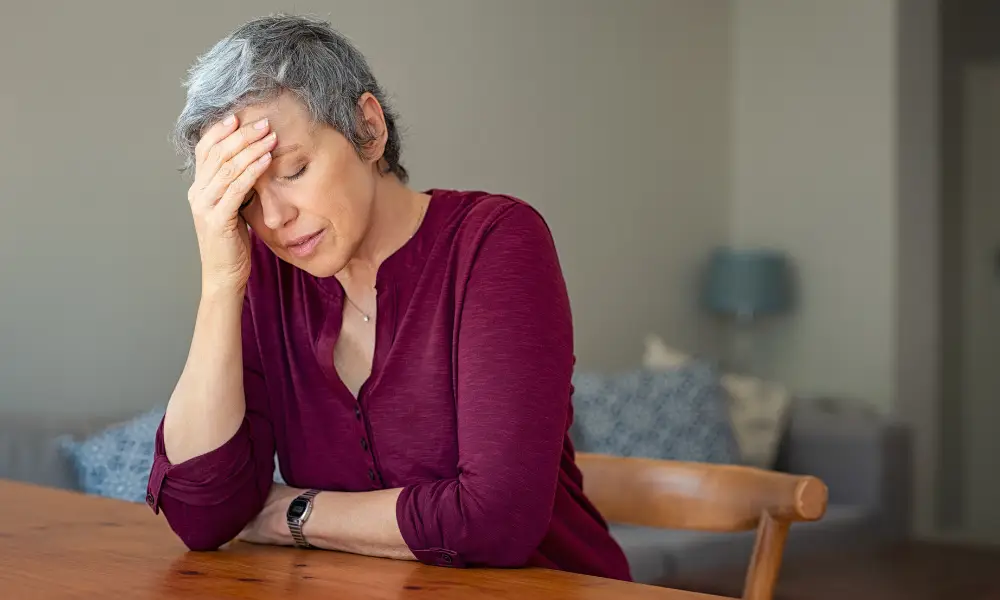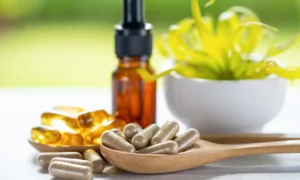Menopause, a natural phase in a woman’s life, is often accompanied by various challenges, and one prevalent issue is menopause anxiety. This article aims to explore the world of natural remedies for menopause anxiety, shedding light on lifestyle adjustments and much more.
Contents
- 1 What Is Menopause Anxiety?
- 2 What Causes Menopause Anxiety?
- 3 Natural Remedies For Menopause Anxiety
- 3.1 Black Cohosh (Cimicifuga racemosa)
- 3.2 Red Clover (Trifolium pratense)
- 3.3 Evening Primrose Oil (Oenothera biennis):
- 3.4 Chaste Tree (Vitex agnus-castus):
- 3.5 Valerian Root (Valeriana officinalis)
- 3.6 Ginseng (Panax ginseng)
- 3.7 Dong Quai (Angelica sinensis)
- 3.8 Passionflower (Passiflora incarnata)
- 3.9 Ginkgo Biloba
- 3.10 St. John’s Wort (Hypericum perforatum)
- 4 Lifestyle Adjustments For Managing Menopause Anxiety
- 5 How Long Does Menopause Anxiety Last?
- 6 Conclusion
What Is Menopause Anxiety? 
Menopause anxiety refers to feelings of worry, fear, or unease that some women may experience during the menopausal transition. Menopause is a natural biological process that marks the end of a woman’s reproductive years, typically occurring in their late 40s or early 50s. It is characterized by the cessation of menstruation and a decline in the production of hormones such as estrogen and progesterone.
What Causes Menopause Anxiety?
Menopause is a natural biological process that marks the end of a woman’s reproductive years. It typically occurs in the late 40s or early 50s and is characterized by a decrease in the production of hormones like estrogen and progesterone. While menopause itself is a normal part of aging, the hormonal changes associated with it can contribute to various physical and emotional symptoms, including anxiety.
Several factors can contribute to menopausal anxiety:
- Hormonal fluctuations
The decline in estrogen levels during menopause can affect the balance of neurotransmitters in the brain, including serotonin and dopamine, which play a role in regulating mood. These hormonal fluctuations can contribute to increased feelings of anxiety and stress. - Sleep disturbances
Menopausal women often experience changes in sleep patterns, such as insomnia or disrupted sleep. Lack of quality sleep can contribute to feelings of anxiety and irritability. - Physical symptoms
Menopause is associated with various physical symptoms, such as hot flashes, night sweats, and palpitations. These symptoms can be distressing and may contribute to heightened anxiety levels. - Psychological factors
The psychological impact of transitioning into a new life stage, often accompanied by changes in body image and self-esteem, can contribute to anxiety. The realization of reaching the end of the reproductive years may also lead to existential concerns and emotional distress. - Genetic and environmental factors
A woman’s susceptibility to anxiety during menopause may be influenced by genetic factors. Additionally, environmental stressors, lifestyle changes, and other life events can contribute to increased anxiety. - Pre-existing mental health conditions
Women with a history of anxiety or depression may be more susceptible to experiencing heightened anxiety during menopause.
It’s important to note that not all women experience anxiety during menopause, and individual experiences can vary.
Natural Remedies For Menopause Anxiety 
Lifestyle Adjustments For Managing Menopause Anxiety
Lifestyle adjustments can play a crucial role in managing menopause anxiety. Making positive changes in your daily habits and routines can help alleviate symptoms and contribute to overall well-being. Here are some lifestyle adjustments to consider:
- Regular Exercise
Engaging in regular physical activity has been shown to reduce anxiety and improve mood. Aim for at least 150 minutes of moderate-intensity exercise per week, such as walking, swimming, or cycling.
- Healthy Diet
Maintain a balanced and nutritious diet. Include a variety of fruits, vegetables, whole grains, and lean proteins. Omega-3 fatty acids found in fish, flaxseeds, and walnuts may also have mood-stabilizing effects.
- Adequate Sleep
Establish a consistent sleep routine. Aim for 7-9 hours of quality sleep each night. Create a comfortable sleep environment, and consider relaxation techniques before bedtime.
- Stress Management Techniques
Practice stress-reducing techniques such as deep breathing, meditation, mindfulness, or progressive muscle relaxation. These can help manage anxiety and promote a sense of calm.
- Limit Caffeine and Alcohol
Reduce the intake of caffeine and alcohol, as they can contribute to anxiety and disrupt sleep. Opt for herbal teas or water as alternatives.
- Hydration
Stay well-hydrated by drinking an adequate amount of water throughout the day. Dehydration can negatively impact mood and exacerbate symptoms.
- Mindfulness and Relaxation Techniques
Incorporate mindfulness practices into your daily routine, such as yoga or tai chi. These activities can help reduce stress and promote relaxation.
- Creative Outlets
Engage in creative activities or hobbies that bring you joy. Whether it’s art, writing, music, or gardening, expressing yourself creatively can be a therapeutic outlet.
- Time Management
Prioritize tasks and manage your time effectively. Breaking down large tasks into smaller, more manageable steps can reduce feelings of overwhelm.
How Long Does Menopause Anxiety Last?
The duration of this experience varies for each individual. For some women, it might be a brief period, lasting only a few months. In contrast, for others, it may persist as a constant presence throughout the entire menopausal journey.
Several factors contribute to the duration, including overall health and stress levels. General well-being and stress management play significant roles. The more stressed or run-down a person is, the greater the likelihood of experiencing a heightened awareness of anxiety and the emergence of anxious feelings during this phase.
Conclusion
In conclusion, managing menopause anxiety involves a multi-faceted approach, combining natural remedies, lifestyle adjustments, and professional guidance. By adopting these strategies, women can navigate this transformative phase with resilience and well-being.
If you are facing menopause related issues, menopause treatment at HerMantra can help. Book your free trial online menopause treatment session now.




